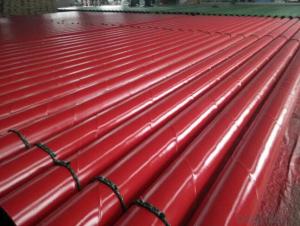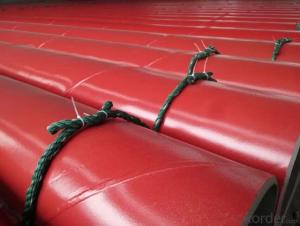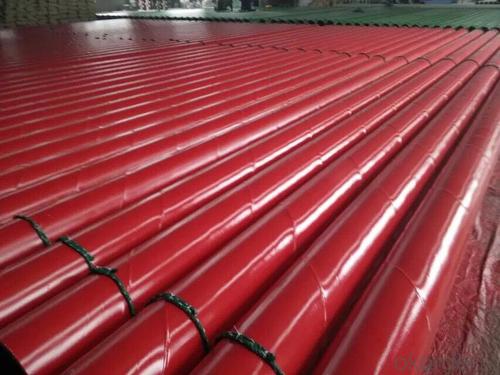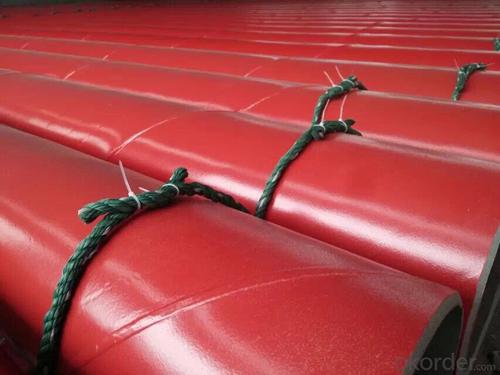LSAW steel pipe external coating
- Loading Port:
- China Main Port
- Payment Terms:
- TT OR LC
- Min Order Qty:
- -
- Supply Capability:
- -
OKorder Service Pledge
OKorder Financial Service
You Might Also Like
Specifications
water pipeline inner-layer tape
1 Butyl rubber as adhesive
2. SGS test report and DVGW certificate
3. corrosion protection
water pipeline inner-layer tape
State-of-the-Art Pipeline Protection for All Climates & Environments
System description:
WATER PIPELINE Inner -layer tape also be called pipe wrap anti-corrosion tape, polyethylene wrap tape.
water pipeline Inner-layer tapeT100 is engineered to assure a high bond to the primed pipe surface with excellent conformability characteristics, aggressive adhesive for corrosion protection and repair of main line coatings.
Inner-layer tapeT100 series is cold applied tape coating system for corrosion protection of Oil, Gas, Petrochemical, and Waste Waterburied pipeline, pipe can be buried, also can be underground ,overhead ,onshore and offshore .
Structure of water pipeline inner wrap tape
The specification of the tape consists of two layers, adhesive layer and film backing
Adhesive: butyl rubber
Film backing: Special blend of stabilized polyethylene
Features & Benefits
Provides a permanent bond to the primed steel pipes surface and provides protection against chemical electrolytic corrosion for underground pipelines.
long term corrosion protection
Worldwide reference lists. Established in-ground history
High chemical resistance under service temperature.
Outstanding electric property and permanent adhesion.
Cold applied, No release liner. Makes installation fast and easy.
Complies with EN-DIN 30672 and AWWAC-214 international standards and also ASTM standards.
Be used for water pipeline corrosion protection
System Properties
Type | T138 | T 150 | T165 | T180 | T 250 | T265 | T280 | |
Thickness | 15mil 0.38mm | 20mil 0.508mm | 25mil 0.635mm | 30mil 0.762mm | 20mil 0.508mm | 25mil 0.635mm | 30mil 0.762mm | |
Backing | 9mil 0.229mm | 9mil 0.241mm | 10mil 0.25mm | 10mil 0.25mm | 15mil 0.38mm | 20mil 0.508mm | 25mil 0635mm | |
Adhesive | 6mil 0.152mm | 11mil 0.279mm | 15mil 0.381mm | 20mil 0.508mm | 5mil 0.127mm | 5mil 0.127mm | 5mil 0.127mm | |
When used for ductile iron pipes inner layer 980-20 or 980-25 and outer layer 955-20 or 955-25 are recommended. | ||||||||
Elongation | ³300% | ³400% | ||||||
Tensile Strength | 55 N/cm | 70 N/cm | ||||||
Color | Black | White | ||||||
Peel Adhesion to Primed Pipe | 33 N/cm | |||||||
Dielectric Strength | 30 KV | |||||||
Dielectric Breakdown | 26 KV/mm | |||||||
Cathodic Disbandment | 0.24 in radius 6.4 mm | |||||||
Water Vapor Transmission Rate | < 0.1% | |||||||
Volume Resistivity | 2.5 x 1015 ohm.cm | |||||||
Impact resistance | 5.5Nm | |||||||
Penetration Resistance | <15% | |||||||
Performance | AWWA C-209,ASTM D 1000,EN 12068 | |||||||
Order information
Length | 100ft(30 M),200ft(60 M),400ft(120 M),800ft(240 M) |
Width | 2’’(50mm),4’’(100mm),6’’(150mm),17’(450mm),32’’(800mm) |
- Q: Can steel pipes be used for transporting liquids?
- Yes, steel pipes can be used for transporting liquids. Steel pipes offer excellent strength, durability, and resistance to corrosion, making them suitable for various applications, including the transportation of liquids such as water, oil, and gas.
- Q: How do you calculate the pipe volume flow rate for steel pipes?
- The pipe volume flow rate for steel pipes can be calculated using the formula: V = A * V_avg, where V is the volume flow rate, A is the cross-sectional area of the pipe, and V_avg is the average velocity of the fluid flowing through the pipe.
- Q: How do you join two steel pipes together without welding?
- One common method to join two steel pipes together without welding is by using mechanical fittings or connectors. These fittings are designed to connect pipes securely without the need for welding. Here are a few options you can consider: 1. Threaded Fittings: Threaded fittings have male and female threads that enable you to screw them together. To join the pipes, you will need to cut the ends of the pipes to create male and female threads. Apply thread sealant to ensure a tight and leak-free connection. 2. Compression Fittings: Compression fittings consist of a nut, a compression ring, and a compression seat. These fittings are designed to create a tight seal by compressing the ring against the seat. Simply slide the compression ring and nut onto the pipe ends, and use a wrench to tighten the nut until it forms a secure connection. 3. Flange Connections: Flange connections involve using flanges, which are flat plates with bolt holes, to join the pipes. The flanges are bolted together using gaskets to create a tight seal. This method is commonly used for larger diameter pipes or in situations where frequent disassembly may be required. 4. Grooved Couplings: Grooved couplings utilize a mechanical coupling housing with two grooved ends that fit over the pipe ends. The coupling is then secured using bolts or screws, which tighten the housing around the pipe ends, creating a secure connection. This method is often used in plumbing and fire protection systems. Before deciding on a method, it is crucial to consider the specific requirements of your application, such as the pipe diameter, pressure, and temperature. Additionally, ensure that the chosen method complies with relevant industry standards and regulations to ensure a safe and reliable connection.
- Q: Can steel pipes be used for electrical conduits?
- No, steel pipes are not suitable for use as electrical conduits. Electrical conduits are typically made of materials such as PVC (polyvinyl chloride) or metal conduits specifically designed for electrical applications.
- Q: How are steel pipes connected or joined together?
- Steel pipes are typically connected or joined together using various methods such as welding, threading, flanges, or couplings.
- Q: What are the factors affecting the durability of steel pipes?
- There are several factors that can affect the durability of steel pipes, including the quality of the steel used, the manufacturing process, the environment in which the pipes are installed, and the maintenance and care given to the pipes.
- Q: How are steel pipes used in the telecommunications infrastructure industry?
- Steel pipes are used in the telecommunications infrastructure industry to provide a strong and durable framework for the installation of fiber optic cables, conduits, and other communication equipment. They are used for underground cable routing, overhead cable support, and the construction of telecommunication towers, ensuring reliable and efficient communication networks.
- Q: How are steel pipes used in seaport infrastructure?
- Steel pipes are commonly used in seaport infrastructure for various purposes such as constructing piers, docks, and wharves. They are also used in the construction of offshore platforms and maritime structures like breakwaters and jetties. Steel pipes provide the necessary strength and durability to withstand the harsh marine environment and are used for the transportation of water, fuel, and other fluids within the port. Additionally, they are employed in the construction of pipelines for the loading and unloading of cargo ships, as well as for dredging and marine construction activities.
- Q: How are steel pipes used in agriculture?
- Steel pipes are widely used in agriculture for various purposes. One common application is irrigation systems. Steel pipes can be used to transport water from a water source, such as a well or a reservoir, to different areas of a farm. These pipes are durable and can withstand the pressure of water, making them ideal for long-distance water transportation. Additionally, steel pipes are also used for drainage systems in agriculture. They can be used to remove excess water from fields, preventing waterlogging and ensuring proper drainage. Steel pipes are resistant to corrosion, which is important in agricultural settings where they may be exposed to moisture and various chemicals. Moreover, steel pipes are used in the construction of greenhouse structures. They provide structural support for the greenhouse framework and allow for the installation of irrigation systems and other equipment. Steel pipes are strong, sturdy, and can withstand harsh weather conditions, making them suitable for greenhouse construction. Furthermore, steel pipes are utilized in livestock farming. They are commonly used to create fences and enclosures for animals, providing a secure and durable barrier. Steel pipes are also used in the construction of animal shelters and barns. In summary, steel pipes play a crucial role in agriculture. They are used for irrigation systems, drainage systems, greenhouse construction, and livestock farming. Their durability, strength, and resistance to corrosion make them an excellent choice for various agricultural applications.
- Q: How are steel pipes repaired if they develop leaks?
- Steel pipes can be repaired if they develop leaks through various methods such as welding, clamping, or using epoxy compounds. The specific repair technique depends on the size and location of the leak as well as the type of pipe, and it is typically carried out by trained professionals with the necessary equipment and expertise.
Send your message to us
LSAW steel pipe external coating
- Loading Port:
- China Main Port
- Payment Terms:
- TT OR LC
- Min Order Qty:
- -
- Supply Capability:
- -
OKorder Service Pledge
OKorder Financial Service
Similar products
Hot products
Hot Searches
Related keywords




















